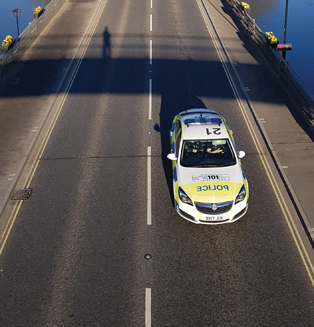Some Police and Crime Commissioners (PCCs) will face more significant pressures than others, a PCC has said after the Government published the provisional Police Grant Report (England and Wales) 2022/23, for how much police forces will get to spend from central government.
West Midlands PCC Simon Foster commented that the government’s police officer ‘uplift’ means that West Midlands Police will only get back 1,218 of the 2,221 officers lost since 2010. He said that the Government had ‘failed West Midlands Police and has failed the people of the West Midlands’. He complained that the region had “a stark choice – raise local council tax or face yet further cuts to policing. The effect of central government decision making in recent years has been that the people of the West Midlands have had to pay more local council tax for less local policing. It is clear – there is to be no levelling-up for West Midlands Police or the people of the West Midlands.”
Home Office minister Kit Malthouse in a written statement to Parliament announced overall funding for policing will rise by up to £1.1 billion compared to the 2021/22 funding settlement, bringing the total up to £16.9 billion. Within this, funding to PCCs will increase by up to an extra £796 million; if, PCCs fully take up their ‘precept flexibility’.
At the Association of Police and Crime Commissioners (APCC) Finance Lead, the Conservative PCC for Essex Roger Hirst said: “PCCs welcome this funding which will enable us to complete the recruitment of 20,000 new police officers. We are delighted that the uplift programme is fully funded which will mean that not only will we get the extra officers, but the necessary technology as well.
“This settlement will also enable policing to complete its shift towards a more prevention-based approach, getting crime down and tackling key areas like drug-driven violence and violence against women and girls. Additional resources given to projects like the Safer Streets Fund play a crucial role in this.
“PCCs recognise that this has been a hugely challenging time for police officers and we want to ensure their work during the pandemic is recognised and that we can invest in them and their capabilities. This three-year settlement is intended to cover a police pay settlement as well as the increase in numbers. However, if inflation does pick up in the months ahead then we would need to go back to Government to ensure that a decent settlement is affordable at the same time as we invest in extra capacity, and police pay is not eroded.
“We acknowledge the fact that whilst the Government is increasing funding centrally, a proportion of the funding is reliant on PCCs increasing the precept locally over the next three years. PCCs will be weighing up demands of community safety against the ability of local people to pay for more policing.
“Whilst this investment will help us to deliver on the policing uplift, we know we have to continue on our drive to make the service more efficient. The process of reviewing the funding formula is also now underway and we are working with the Government to progress it as quickly as possible to ensure that the system is fairer for the public.”
Essex’s budget stands to rise from £335.5m to a maximum allowed of £355m; South Yorkshire’s, from £297.1m to £314.3m. The final police funding settlement will be debated in Parliament ahead of the new financial year.
APCC Deputy Finance Lead Dr Alan Billings, Labour PCC for South Yorkshire, said: “The police grant settlement will impact differently on different forces.
“For those force areas that are more dependent on grant than council tax – which tend to be more urban and more northerly – the finances this year will be very challenging. Meeting the increase in officers and everything that follows from that will bring extra pressures.
“While the continued increase in police officer numbers is welcomed, it would be a step back if this could only be achieved in some forces by having warranted officers drafted into what should be civilian posts or by losing police community support officers.
“The assumptions in the settlement for inflation may turn out to be unrealistic as general inflation is rising and police pay is subject to negotiation next year. PCCs and chief finance officers will have to make their own prudent decisions.
“The total funding available for policing assumes that council tax precepts will be set at £10 more for a Band D property. This will be seen as a significant and unwelcome tax increase in those parts of the country where people are already struggling financially. Yet these are often places of more serious crime, because serious crime breeds in deprived communities.”
Kit Malthouse said: “We have asked a lot of our police over the course of the pandemic, and while it’s true that our neighbourhoods are getting safer, we are removing weapons and drugs from our streets and we are putting thousands more police on the beat, now is not the time to take our foot off the pedal. Beating crime is the government’s number one priority, and I am confident this settlement will give the police the resources they need to keep our families and our communities safe.”
The Home Office said that the settlement includes more money to enable the police to tackle Serious Organised Crime. Counter Terrorism police funding passes £1 billion a year for the first time. Some £1.4 billion will be spent to deliver on national priorities, the Home Office said, including taking down more county lines, reducing violent crime, child sexual abuse and exploitation, fraud and modern slavery.










